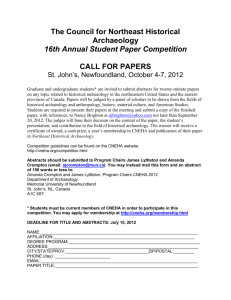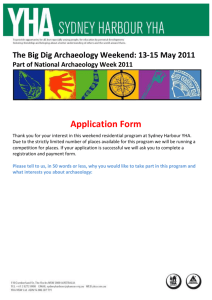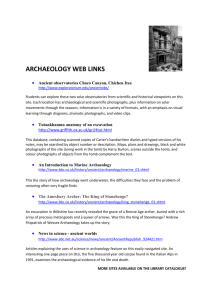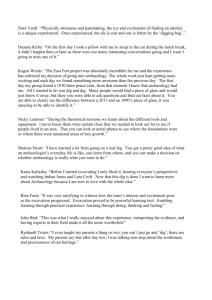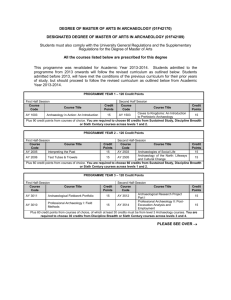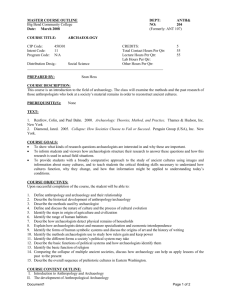History Civilisations and Beliefs BA( Hons)
advertisement
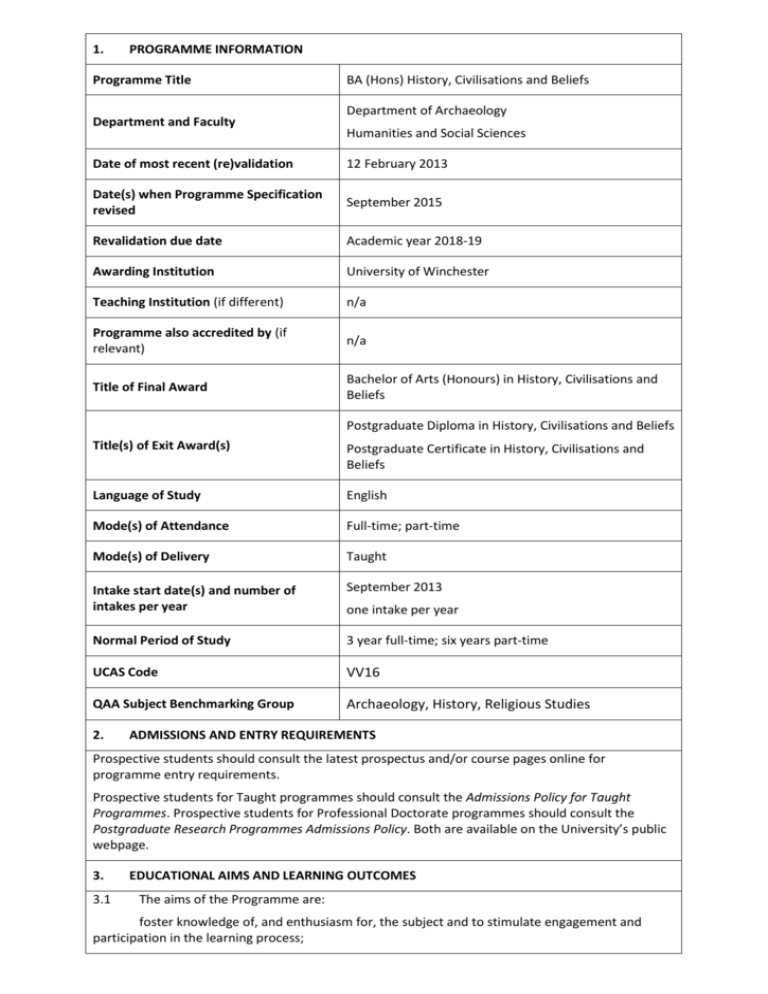
1. PROGRAMME INFORMATION Programme Title Department and Faculty BA (Hons) History, Civilisations and Beliefs Department of Archaeology Humanities and Social Sciences Date of most recent (re)validation 12 February 2013 Date(s) when Programme Specification revised September 2015 Revalidation due date Academic year 2018-19 Awarding Institution University of Winchester Teaching Institution (if different) n/a Programme also accredited by (if relevant) n/a Title of Final Award Bachelor of Arts (Honours) in History, Civilisations and Beliefs Postgraduate Diploma in History, Civilisations and Beliefs Title(s) of Exit Award(s) Postgraduate Certificate in History, Civilisations and Beliefs Language of Study English Mode(s) of Attendance Full-time; part-time Mode(s) of Delivery Taught Intake start date(s) and number of intakes per year September 2013 Normal Period of Study 3 year full-time; six years part-time UCAS Code VV16 QAA Subject Benchmarking Group Archaeology, History, Religious Studies 2. one intake per year ADMISSIONS AND ENTRY REQUIREMENTS Prospective students should consult the latest prospectus and/or course pages online for programme entry requirements. Prospective students for Taught programmes should consult the Admissions Policy for Taught Programmes. Prospective students for Professional Doctorate programmes should consult the Postgraduate Research Programmes Admissions Policy. Both are available on the University’s public webpage. 3. 3.1 EDUCATIONAL AIMS AND LEARNING OUTCOMES The aims of the Programme are: foster knowledge of, and enthusiasm for, the subject and to stimulate engagement and participation in the learning process; 1. encourage students to reflect on and take responsibility for their own learning; 2. provide opportunities for the acquisition and development of key skills that will be applicable to future employability and further advanced study; 3. establish a broad foundation of skills in relation to the study of history, religion and archaeology; 4. give students the knowledge to study and analyse culture and religion as a significant dimension in historical and contemporary societies; 5. make students intellectually trained and practically skilled individuals who emerge from the programmes able to share their learning with the community in a variety of professional and non-professional contexts. 3.2 The Learning Outcomes of the Programme are: Level 4 Students will have: 1. a familiarity with the methodologies of History, Theology, Religious Studies and Archaeology; 2. a familiarity with some key ethical debates relating to religious and cultural traditions; 3. a familiarity with the concepts of continuity and change, with reference to history from more than one period and context; 4. the ability to identify, locate and distinguish sources in print and on-line and have an understanding of the importance of critical distance from their sources; 5. developed an awareness and initial understanding of several historical periods, cultures and religious traditions, from prehistory to the contemporary, as a basis for more advanced study; 6. started developing skills in critical analysis, oral, presentation, and written communication; 7. learnt about working independently and in groups. Level 5: Students will have: 1. extended their study to new topics, periods, cultures and approaches; 2. critically engaged with values, societies, religious traditions, and cultures different to their own; 3. developed the ability to present a well-researched and coherent argument over an extended piece of writing; 4. a sound knowledge of particular religious traditions (or/ and) a number of issues relating to various or particular religious traditions; 5. strengthened their skills in independent learning and study skills. 6. built transferable/ employability skills while studying; 7. enhanced their skills to analyze, argue, assess and present data in a variety of formats in relation to Historical, Religious Studies, Theological and Archaeological methodologies. Level 6: Students will have: 1. demonstrated proficiency in using primary sources for study; 2. applied a sophisticated critical terminology and grasp of concepts to the study of detailed and specific topics in at least one of the fields of History, Religious Studies, Theology, Archaeology; 3. demonstrated proficiency in intensive research and independent study; 4. an enhanced appreciation of the applicability of the skills acquired on the degree beyond graduation; Page 2 of 12 5. sound skills in critical analysis, oral presentation, argumentation and written communication; 6. a detailed knowledge of various areas and aspects of specific cultures and religions in various periods. On successful completion of this programme, students will be able to demonstrate the following skills of: A. Knowledge and Understanding a) Of the methodologies and skills used in the study of History, Theology, Religious Studies, and Archaeology; b) Of a range of cultures and religious traditions from various periods from prehistory to the contemporary. B. Intellectual and Cognitive Skills a) Critical analysis and argumentation; b) Problem solving skills; c) Ability to assess source materials. C. Skills and other Attributes a) Oral communication and presentation skills; b) Written communication skills; c) Website development; d) Cultural empathy and multicultural awareness. A grid mapping the Modules to the Programme/Level Learning Outcomes is included in Appendix 1 Learning for the Workplace: the programme addresses the graduate employability skills of students in the following ways: a) a knowledge of contemporary issues concerning Equality and religion in the UK and beyond; b) the ability to use appropriate software for website production; c) skills in a range of written formats, such as reports, dossiers, etc. d) knowledge and methodologies applicable to a range of careers from teaching to heritage management; e) a sensitivity to cultural differences, and an empathetic understanding and awareness of diversity 4. PROGRAMME STRUCTURE, LEVELS, MODULES, CREDIT AND AWARDS This section outlines the levels of study, modules and credits required for each programme (where there is more than one) and for final and exit awards. All modules are 15 credits and Mandatory/Core (except the Dissertation) Glossary Core = modules must be taken and passed Mandatory = modules must be taken but may be eligible for compensation Optional = modules may be selected by students, subject to availability Modules with grey shading are optional choices within the mandatory/core element All other modules are ‘Mandatory’ except the Dissertation preparation module and the Dissertation (EIS) module. Page 3 of 12 Year 1 Introduction to Archaeology (AC1001) History Introductory Study Students choose one the following: HS1010A, HS1012, HS1041, or HS1051 Archaeology of the Historic Period (AC1900) Either: The Shaping of the Past (HS1110) Or: Understanding Ethics and Religion (RT1101) World Pre-History (AC1901) Understanding Religions 1 (RT1104) Understanding Religions 2 (RT1105) Historical Landmarks (HS1103) Religion, Spirituality and Ethics in the UK (RT2100) Past Historians and Current Practice (HS2206) Religion, Spirituality and Ethics in Europe (RT2101) Either: The Archaeology of Religion and Ritual (AC2045) * Or: The Archaeology and History of Death (AC2046) * Students choose one of the following Dissertation (EIS) preparation module relevant to their intended EIS Subject: Independent Study Module (RT2026), Independent Study Module (HS2207) or Research Methods Module (AC2035) History Civilisation Study * Students choose one of the following: HS2072A or B; HS 2073A or B, HS2074A or B; HS 2075A or B Archaeological Module Option * Students choose one of the following: AC2013, AC2044, AC2047, AC2050 AC2062 Volunteering module, Work Placement module or Optional Module # Students choose one of the following: Volunteering for TRS (RT2099), Volunteering in History (HS2099) Or another optional module available to HCB students # Year 2 Year 3 Students choose any two of the following Archaeology modules: The Celts (AC3012), Church Archaeology (AC3050), The Archaeology of Space and Place (AC3021), Byzantium and Beyond (AC3804), The Archaeology of Africa (AC3900) Students choose any two of the following Theology & Religious Studies modules: Advanced Studies in Ethics and Spirituality 1 (RT3100), Advanced Studies in Ethics and Spirituality 2 (RT3101), Advanced Studies in Religion 1 (RT3102), Advanced Studies in Religion 2 (RT3103), Advanced Studies in Theology 1 (RT3104), Advanced Studies in Theology 2 (RT3105) Students choose one of the following pairs of conjoined Depth Study History modules: Pax Romana (HS3373 and 3374), Norman Conquest (HS3368 and HS3369), Wars of the Roses (HS3315 and HS3316), Japan (HS3329 and HS3330) Students choose one 30 credit Dissertation (EIS) module normally in the same Subject as their Dissertation preparation module (see Year 2 above): Dissertation (TRS) (RT3002) Dissertation in History (HS3002) Page 4 of 12 Dissertation (Archaeology) (AC3002A) * One of these modules/module types may be taken as an optional module instead of a Volunteering Module in year 2 (see # in list of modules for year 2 above) # Students may choose any module/module type marked by an ‘*’ in place of a Volunteering Module in year 2 provided that they have not already taken it. Part-time structure: Year 1/ Level 4: AC1001; RT1004; AC1900; HS1103 Year 2/ Level 4: AC1901; HIS; RT1105; HS1110 or RT1101 Year 3/ Level 5: RT2100; RT2101; HS2206; an archaeology choice Year 4/ Level 5: An archaeology choice; ISM; HCS; Volunteering or option Year 5/ Level 6: HDS + 1 archaeology option & 1 TRS option; or 2 archaeology & 2 TRS options Year 6/ Level 6: Dissertation + either HDS or 1 archaeology & 1 TRS option 5. LEARNING, TEACHING AND ASSESSMENT 5.1 Means of delivery: HCB will be taught by a range of methods which may include, with the Key Information Set (KIS) activity type is indicated in brackets, : Lectures, often of an interactive nature (KIS: lecture) Group seminar and discussion (KIS: seminar) Individual tutorials in person, by email or phone (KIS: tutorial) Study skills guidance (KIS: practical skills and workshops/lecture) Field visits, interviews (KIS: external visits) Independent research (KIS: guided independent study) Additional information, which complements this, is available via the Unistats ‘widget’ on the University’s individual course pages (applicable only for undergraduate programmes). 5.2 Types of assessment employed: The Key Information Set (KIS) activity type is indicated in brackets. Essay (KIS: written assignment): generally a 2000 word systematic and analytical exposition on a set question. Exams and Timed Essays (KIS: written exam): involves answering one or more essay/ exam questions within a set period, either under exam conditions or as open timed questions. Dossier, Reports, etc.(KIS: report): generally 2000 word pieces which do not conform to standard essay format, may be set out as formal reports, or in other formats. These especially build employability skills by getting students used to writing ‘report’ or ‘dossier’ type papers that may be needed in workplace situations. Fieldwork or Practical Skills (KIS: practical skills assessment): specific pieces of fieldwork or other practical skills, i.e. library exercises. Presentation (KIS: oral assessment and presentation): oral presentations, either individual or in Page 5 of 12 groups. Extended Project (KIS: dissertation): pieces of writing that are much longer than the standard essay. Website (KIS: practical skills assessment): creation of a website for assessment, using Dreamweaver or other software and employing suitable, i.e. non-linear, formats. Builds employability skills. A grid detailing the assessments by module is available in Appendix 2. The interests of students with protected characteristics will be taken into consideration and reasonable adjustments to assessments will be made provided that these do not compromise academic standards as expressed through the learning outcomes. 5. QUALITY ASSURANCE AND ENHANCEMENT 6.1 Mechanisms for review and evaluation: Quality assurance and enhancement at Module Level Students provide feedback to module tutors through Module Evaluation Forms, reviews and other responses. The tutor collates the evaluation forms and produces a response for discussion at Programme Committee. The response identifies good practice and proposes remedies for any points of concern. The response is made available to students at the next running of the module. Quality assurance and enhancement at Programme Level The Programme Committee evaluates the success of the programme, paying particular attention to student feedback and student representatives. Minutes from the Programme Committee and the External Examiners report will inform the Annual Programme Evaluation which is submitted for approval to the Faculty Academic Development Committee. Issues for attention are identified and included in the action plan for the following year. Quality assurance and enhancement at Department Level The Annual Programme Evaluation is submitted to the Department for discussion and to draw out department objectives. Quality assurance and enhancement at Faculty Level The Annual Programme Evaluation is submitted to the Faculty Academic Development Committee which has oversight of learning development in the Faculty, including via the Peer Observation of Teaching. Quality assurance and enhancement at University Level The quality of the programme is monitored by an External Examiner appointed by the University’s Senate Academic Development Committee. The External Examiner’s Report is distributed to the Vice-Chancellor, First Deputy Vice-Chancellor, Director of Academic Quality and Development, the Faculty Dean and Faculty Head of Quality. A summary of all external examiner reports is received at Senate Academic Development Committee. An annual audit of Faculties is conducted by Senate Academic Development Committee. Quality assurance and enhancement for Staff The quality of learning and teaching is supported by the Peer Observation of Teaching and Staff Development, by Staff Development and Review, by attendance at conferences and curriculumfocused staff development, by external involvement such as external examining and by involvement in research and knowledge exchange activities. 6.2 Indicators of Quality and Standards External Examiner Report(s) Annual Monitoring process Student feedback including the National Student Survey or Postgraduate Taught Experience Survey Page 6 of 12 Student representation at Faculty level and University level committees Programme Revalidation Higher Education Review 7. THE REGULATORY & POLICY FRAMEWORK 7.1 The programme conforms fully with the University’s: Academic Regulations for Taught Programmes 7.2 No exemptions from the Academic Regulations are required. 7.3 External Professional Statutory Regulatory Body Accreditation None 7.4 Engagement with UK Quality Code and Subject Benchmarks Validation and Revalidation assure the University of the Programme’s continued engagement with FHEQ and appropriate consideration of subject benchmarks. Between validations external examiners assure the University that this engagement remains active and evident. 7.5 Engagement with Work Based Learning and Placements Approved Procedures The programme includes an optional volunteering module at level 5. This experience is defined as ‘work based learning’ in that the learning on this module will take place within the context of (voluntary) employment. In all cases learning on these modules will adhere to the latest version of the University’s WorkBased Learning and Placements – Approved Procedures. Approval of work-based learning and placement opportunities in line with these procedures will be the responsibility of the module tutor in each case who will act in the role of placement co-ordinator as defined in these procedures. These module tutors will, where appropriate, work in collaboration with appropriate faculty or central University staff such as the Volunteering Co-ordinator. Page 7 of 12 Appendix 1 Grid mapping Modules to Programme/Level Learning Outcomes Level 4 1. a familiarity with the methodologies of History, Theology, Religious Studies and Archaeology; 2. a familiarity with some key ethical debates relating to religious and cultural traditions; 3. a familiarity with the concepts of continuity and change, with reference to history from more than one period and context; 4. the ability to identify, locate and distinguish sources in print and on-line and have an understanding of the importance of critical distance from their sources; 5. developed an awareness and initial understanding of several historical periods, cultures and religious traditions, from prehistory to the contemporary, as a basis for more advanced study; 6. started developing skills in critical analysis, oral, presentation, and written communication; 7. learnt about working independently and in groups. LO1 LO2 LO3 LO4 LO5 LO6 LO7 x x x x x x x x x x x x x x x x x x x x LEVEL 4 Introduction to Archaeology World Prehistory Archaeology of the historic period x x x British Introductory Module: English History 1272 - 1500 x x Historical Landmarks x Understanding Ethics and Religion x x x x x Understanding Religion 1: x x x x x Understanding Religion 2: x x x x x x x Page 8 of 12 x Level 5 1. extended their study to new topics, periods, cultures and approaches; 2. critically engaged with values, societies, religious traditions, and cultures different to their own; 3. developed the ability to present a well-researched and coherent argument over an extended piece of writing; 4. a sound knowledge of particular religious traditions (or/ and) a number of issues relating to various or particular religious traditions; 5. strengthened their skills in independent learning and study skills. 6. built transferable/ employability skills while studying; 7. enhanced their skills to analyse, argue, assess and present data in a variety of formats in relation to Historical, Religious Studies, Theological and Archaeological methodologies. Level 5 LO1 Excavation x The Archaeology of Ritual and Death x Independent Study in History :LO2 LO3 LO5 LO6 LO7 x x x x x x x x x x x x x x x Civilisation Studies (History) x x x x x x Religion, Spirituality and Ethics in the UK Today x x x x x x x Religion, Spirituality and Ethics in Europe Today x x x x x x x Buddhism in Global Contexts x x x x x x x Past Historians and Current Practice x x x x x x Page 9 of 12 LO4 Level 6 1. demonstrated proficiency in using primary sources for study; 2. applied a sophisticated critical terminology and grasp of concepts to the study of detailed and specific topics in at least one of the fields of History, Religious Studies, Theology, Archaeology; 3. demonstrated proficiency in intensive research and independent study; 4. an enhanced appreciation of the applicability of the skills acquired on the degree beyond graduation; 5. sound skills in critical analysis, oral presentation, argumentation and written communication; 6. a detailed knowledge of various areas and aspects of specific cultures and religions in various periods. Level 6 LO1 LO2 LO3 LO4 LO5 Dissertation in History x x x x x Church Archaeology x x x x x x Byzantium and Beyond x x x x x x Pax Romana 1 x x x x x x Pax Romana 2 x x x x x x Advanced Studies in Ethics and Spirituality 1: Interfaith Dialogue and Social Change x x x x x x Advanced Studies in Religion 2: Indigenous Religion x x x x x x Page 10 of 12 LO6 Appendix 2 Grid mapping Assessments Each column is headed by the name of assessment type, as defined by the Programme (not KIS), eg blog, essay, portfolio. Module Title Essay or Category Critique, Report, Dossier Exam or Timed Test Fieldwork or Practical or Skills based Presentation X XG 0 1 1 X X Extended Project Website 0 0 LEVEL 4 Introduction to Archaeology World Prehistory Archaeology of the historic period British Introductory Module: English History 1272 - 1500 Historical Landmarks Understanding Ethics and Religion Understanding Religion 1: Understanding Religion 2: X X X X X X X X 2X X 1=F 2X 1=F X X 6 3 LEVEL 5 Excavation The Archaeology of Ritual and Death Independent Study in History Civilisation Studies (History) Religion, Spirituality and Ethics in the UK Today X X X X X Or X X X Page 11 of 12 Module Title or Category Religion, Spirituality and Ethics in Europe Today Buddhism in Global Contexts Past Historians and Current Practice Essay Critique, Report, Dossier Exam or Timed Test Fieldwork or Practical or Skills based X Presentation Extended Project X Website X X X 2X 4 3 3 1 2 1 2 Level 6 Dissertation in History Church Archaeology Byzantium and Beyond Pax Romana 1 X X X X X X X Pax Romana 2 X X Advanced Studies in Ethics and Spirituality 1: Interfaith Dialogue and Social Change Advanced Studies in Religion 2: Indigenous Religion X X 2XF X 5 1 2 0 5 Key: F = formative G = group Page 12 of 12 1 0


